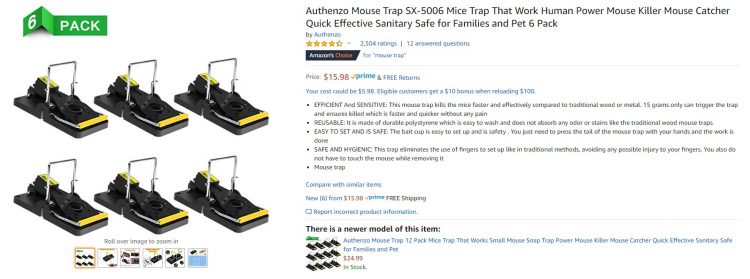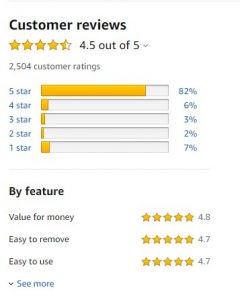When I wrote my book Meeting Hero, I knew Amazon reviews were important. So I followed the publishing advice I found online and sent a PDF copy to colleagues, suggesting that if they found it helpful, I’d appreciate their review on Amazon.
Many were kind enough to oblige. And thanks to them, I could now claim that I had 5-star rated book on Amazon. Here’s the proof.

I didn’t tell people they had to rate it high, but I assumed they would if they took the time to write the review.
Mousetraps
This summer I had a big problem with mice eating all the vegetables in my garden. One day, after they wiped out my beet crop, I decided it was time to fight back. I went online and after reading lots of reviews decided to purchase these mousetraps.


I mean, they had to be good. They looked way more high tech than the old cheapo wood ones I had been using. Plus, the reviews were phenomenal.
When they arrived, I set them up, and within 45 minutes had caught my first mouse, one that looked particularly full of fresh beets.
Inside the box, there was a small card informing me that if I wrote a 5-star review for the mousetraps on Amazon, the seller would send me a $15 Amazon gift card. Seriously? I had to check back to see what I paid to start with.
Having only paid $15.98, this was a great deal. Feeling good about catching my first mouse, I had no qualms about giving them a 5-star review. About a week later, the seller sent me my gift card, and I promptly used it on my next Amazon purchase.
Gloves
Last week I needed to replace a pair of gloves that had holes in them. Again I scoured the reviews on Amazon and settled on these.


The reviews were amazing.
I don’t want you to think I only look at the star-rating. Nope, I read the reviews. These looked like the perfect pair.
I was happy they were delivered the next day. They fit well. They were a little smelly, so I left them out. I haven’t really given them a good test drive yet, as it’s cold enough to be wearing my “serious winter wear.”
In the bottom of the box, I noticed a piece of paper.

The English was a little rough, but from what I could tell, they were offering me a free hat to go along with my gloves. Who doesn’t like that deal?
I was hesitant to send them my email, but figured they already had my name and address. Finding my email wouldn’t be hard for someone who actually wanted it. Plus I was curious about how this would work.
Here’s the follow-up email they sent. The highlighting is mine.

Once again, I’m being paid (maybe) to provide a review. Because I don’t know how the gloves will last and haven’t given them a solid run yet, I don’t want to give them the review. Plus whenever I see Paypal and poorly worded emails, my radar goes up.
I guess I’m not getting a hat after all.
Need a New Method to Evaluate Purchases
Okay, I always knew reviews were a little sketchy. My assumption was that only people who had something go seriously wrong would be motivated to write one.
Based on that assumption, I often disregarded those who seemed most upset. My conclusion was that the product was likely better than the reviews indicated.
I also knew a few of the best reviews may have come from the seller’s friends and family. But how many people could that be?
What had not occurred to me, until recently, was that even for low dollar items, people were gaming the system by buying reviews. Not sure how they makes financial sense for the sellers, but it must work out. Why else would the seller give me back $15 on a purchase of $15.98?
Maybe I shouldn’t spend so much time reading reviews. I’ll have to figure out a new way to evaluate my purchases.
Suggestions, anyone?

